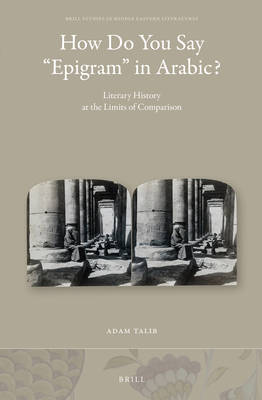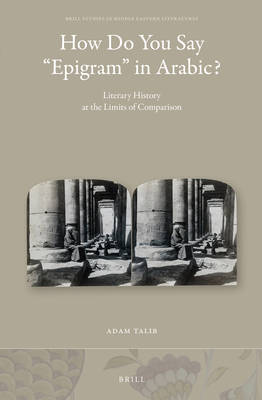
- Afhalen na 1 uur in een winkel met voorraad
- Gratis thuislevering in België vanaf € 30
- Ruim aanbod met 7 miljoen producten
- Afhalen na 1 uur in een winkel met voorraad
- Gratis thuislevering in België vanaf € 30
- Ruim aanbod met 7 miljoen producten
Zoeken
How Do You Say "Epigram" in Arabic?: Literary History at the Limits of Comparison
Adam Talib
€ 227,45
+ 454 punten
Omschrijving
The qaṣīdah and the qiṭʿah are well known to scholars of classical Arabic literature, but the maqṭūʿ, a form of poetry that emerged in the thirteenth century and soon became ubiquitous, is as obscure today as it was once popular. These poems circulated across the Arabo-Islamic world for some six centuries in speech, letters, inscriptions, and, above all, anthologies. Drawing on more than a hundred unpublished and published works, How Do You Say "Epigram" in Arabic? is the first study of this highly popular and adaptable genre of Arabic poetry. By addressing this lacuna, the book models an alternative comparative literature, one in which the history of Arabic poetry has as much to tell us about epigrams as does Greek.
Specificaties
Betrokkenen
- Auteur(s):
- Uitgeverij:
Inhoud
- Aantal bladzijden:
- 352
- Taal:
- Engels
- Reeks:
- Reeksnummer:
- nr. 40
Eigenschappen
- Productcode (EAN):
- 9789004349964
- Verschijningsdatum:
- 26/10/2017
- Uitvoering:
- Hardcover
- Formaat:
- Genaaid
- Afmetingen:
- 160 mm x 236 mm
- Gewicht:
- 635 g

Alleen bij Standaard Boekhandel
+ 454 punten op je klantenkaart van Standaard Boekhandel
Beoordelingen
We publiceren alleen reviews die voldoen aan de voorwaarden voor reviews. Bekijk onze voorwaarden voor reviews.











